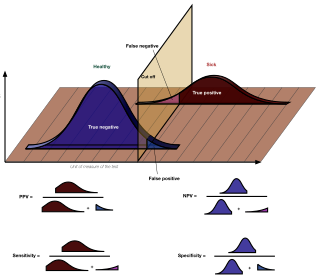Related Research Articles
In evidence-based medicine, likelihood ratios are used for assessing the value of performing a diagnostic test. They use the sensitivity and specificity of the test to determine whether a test result usefully changes the probability that a condition exists. The first description of the use of likelihood ratios for decision rules was made at a symposium on information theory in 1954. In medicine, likelihood ratios were introduced between 1975 and 1980.

Tamoxifen, sold under the brand name Nolvadex among others, is a selective estrogen receptor modulator used to prevent breast cancer in women and men. It is also being studied for other types of cancer. It has been used for Albright syndrome. Tamoxifen is typically taken daily by mouth for five years for breast cancer.

The positive and negative predictive values are the proportions of positive and negative results in statistics and diagnostic tests that are true positive and true negative results, respectively. The PPV and NPV describe the performance of a diagnostic test or other statistical measure. A high result can be interpreted as indicating the accuracy of such a statistic. The PPV and NPV are not intrinsic to the test ; they depend also on the prevalence. Both PPV and NPV can be derived using Bayes' theorem.

Invasive carcinoma of no special type, invasive breast carcinoma of no special type (IBC-NST), invasive ductal carcinoma (IDC), infiltrating ductal carcinoma (IDC) or invasive ductal carcinoma, not otherwise specified (NOS) is a disease. For international audiences this article will use "invasive carcinoma NST" because it is the preferred term of the World Health Organization (WHO).
MammaPrint is a prognostic and predictive diagnostic test for early stage breast cancer patients that assess the risk that a tumor will metastasize to other parts of the body. It gives a binary result, high-risk or low-risk classification, and helps physicians determine whether or not a patient will benefit from chemotherapy. Women with a low risk result can safely forego chemotherapy without decreasing likelihood of disease free survival. MammaPrint is part of the personalized medicine portfolio marketed by Agendia.

In medicine and statistics, sensitivity and specificity mathematically describe the accuracy of a test that reports the presence or absence of a medical condition. If individuals who have the condition are considered "positive" and those who do not are considered "negative", then sensitivity is a measure of how well a test can identify true positives and specificity is a measure of how well a test can identify true negatives:
Medical statistics deals with applications of statistics to medicine and the health sciences, including epidemiology, public health, forensic medicine, and clinical research. Medical statistics has been a recognized branch of statistics in the United Kingdom for more than 40 years, but the term has not come into general use in North America, where the wider term 'biostatistics' is more commonly used. However, "biostatistics" more commonly connotes all applications of statistics to biology. Medical statistics is a subdiscipline of statistics.
It is the science of summarizing, collecting, presenting and interpreting data in medical practice, and using them to estimate the magnitude of associations and test hypotheses. It has a central role in medical investigations. It not only provides a way of organizing information on a wider and more formal basis than relying on the exchange of anecdotes and personal experience, but also takes into account the intrinsic variation inherent in most biological processes.

A medical test is a medical procedure performed to detect, diagnose, or monitor diseases, disease processes, susceptibility, or to determine a course of treatment. Medical tests such as, physical and visual exams, diagnostic imaging, genetic testing, chemical and cellular analysis, relating to clinical chemistry and molecular diagnostics, are typically performed in a medical setting.
Triple-negative breast cancer (TNBC) is any breast cancer that either lacks or shows low levels of estrogen receptor (ER), progesterone receptor (PR) and human epidermal growth factor receptor 2 (HER2) overexpression and/or gene amplification. Triple-negative is sometimes used as a surrogate term for basal-like.

Tom Osborne is a former politician in Newfoundland and Labrador, Canada. He represented the district of Waterford Valley in the Newfoundland and Labrador House of Assembly from 1996 to 2024. He was a member of the Liberal Party, a former member of the Progressive Conservative Party, and a former Minister in Danny Williams' first cabinet. He served as Minister of Health and Community Services, and Minister of Education in the Furey government. He was Speaker of the House of Assembly from 2015 to 2017.
John Ottenheimer is a Canadian lawyer and politician in Newfoundland and Labrador, Canada. Ottenheimer is a former Cabinet minister in the government of Danny Williams and represented the district of St. John's East for the Progressive Conservative Party from 1996 to 2007. He unsuccessfully ran for the leadership of the Progressive Conservatives in 2014 losing to Paul Davis.
Breast cancer management takes different approaches depending on physical and biological characteristics of the disease, as well as the age, over-all health and personal preferences of the patient. Treatment types can be classified into local therapy and systemic treatment. Local therapy is most efficacious in early stage breast cancer, while systemic therapy is generally justified in advanced and metastatic disease, or in diseases with specific phenotypes.
The estrogen receptor test (ERT) is a laboratory test to determine whether cancer cells have estrogen receptors. This information can guide treatment of the cancer.
Margaret A. Cameron is a Canadian jurist and current Justice of the Supreme Court of Newfoundland and Labrador.
Breast cancer classification divides breast cancer into categories according to different schemes criteria and serving a different purpose. The major categories are the histopathological type, the grade of the tumor, the stage of the tumor, and the expression of proteins and genes. As knowledge of cancer cell biology develops these classifications are updated.
Pre-test probability and post-test probability are the probabilities of the presence of a condition before and after a diagnostic test, respectively. Post-test probability, in turn, can be positive or negative, depending on whether the test falls out as a positive test or a negative test, respectively. In some cases, it is used for the probability of developing the condition of interest in the future.

Gynecomastia is the abnormal non-cancerous enlargement of one or both breasts in males due to the growth of breast tissue as a result of a hormone imbalance between estrogens and androgens. Gynecomastia can cause significant psychological distress or unease.

Chesley Furneaux "Ches" Crosbie, is a Canadian lawyer and former politician. Crosbie was elected leader of the Progressive Conservative Party of Newfoundland and Labrador on April 28, 2018 serving until March 31, 2021. He served as the Leader of the Opposition in the Newfoundland and Labrador House of Assembly from 2018 until 2021.
John Abbott is a Canadian politician, who was elected to the Newfoundland and Labrador House of Assembly in the 2021 provincial election. He defeated the leader of the New Democratic Party, Alison Coffin, to represent the electoral district of St. John's East-Quidi Vidi as a member of the Liberal Party of Newfoundland and Labrador.
References
- 1 2 "Liberals cite cancer inquiry conflict". CBC News . 9 April 2008. Archived from the original on 13 November 2012.
- 1 2 Sweet, Barb (September 11, 2008). "Doctor regrets her part in decision not to disclose test results". The Telegram. St. John's. Archived from the original on 10 August 2011.
- ↑ "Government Releases Cameron Inquiry Report". Government of Newfoundland and Labrador. March 3, 2009.
- ↑ "Never wanted test result problems disclosed, manager tells cancer probe". CBC News. 23 October 2008. Archived from the original on 13 November 2012. Retrieved 6 February 2009.
- 1 2 3 "Premier's office did not see alarm of cancer tests, inquiry told". CBC News. June 10, 2008. Archived from the original on 11 June 2008.
- ↑ "Premier's office felt Eastern Health handling crisis, Cameron Inquiry told". The Telegram. Archived from the original on 9 September 2018. Retrieved 6 February 2009.
- ↑ "Oncologist apologizes to patients at breast cancer inquiry". CBC News. 19 September 2008. Archived from the original on 4 November 2012. Retrieved 6 February 2009.
- ↑ "Little comfort level with cancer numbers, MD tells inquiry". CBC News. 26 May 2008. Archived from the original on 4 November 2012. Retrieved 6 February 2009.
- ↑ "No curbs on lawyers, Cameron inquiry tells N.L." CBC News. May 24, 2008. Archived from the original on 26 May 2008. Retrieved 6 February 2009.
- 1 2 "Williams rejects bullying accusations over cancer inquiry". CBC News. 13 May 2008. Archived from the original on 13 May 2008. Retrieved 6 February 2009.
- ↑ "Not given lab results until this year, final witness tells cancer probe". CBC News. 31 October 2008. Retrieved 6 February 2009.
- ↑ "Judge needed for clarity in breast cancer negotiations: lawyer". CBC News. 8 October 2008. Archived from the original on 4 November 2012. Retrieved 6 February 2009.
- ↑ "N.L.'s Eastern Health Authority settles $17M lawsuit". CBC News. 31 October 2009. Retrieved 5 September 2012.